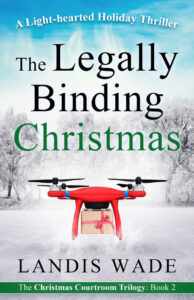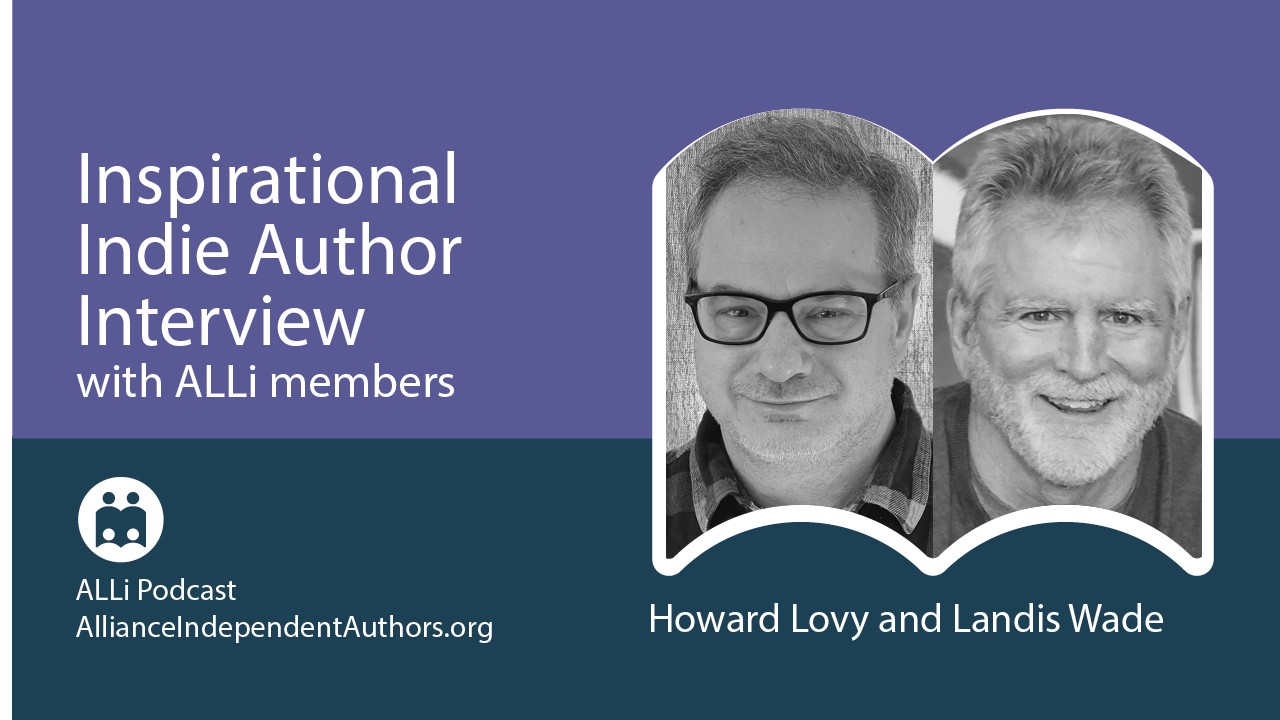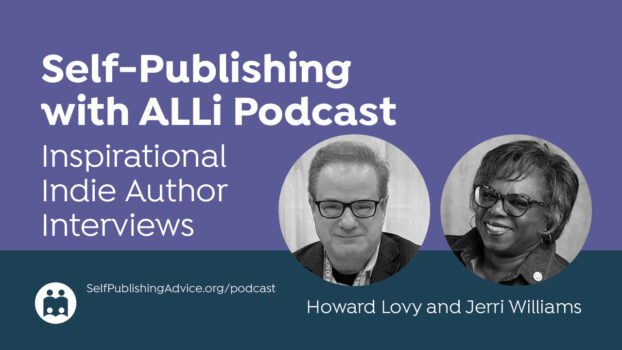My ALLi author guest this episode is Landis Wade, who was a trial lawyer until he reached his fifties, and then decided he wanted to leave a different kind of legacy than just the cases he's won. So he set out on a different journey as an indie author. Along the way, he launched a podcast to learn from other authors just how to run an indie publishing business.
 ALLi's Inspirational Indie Author Podcast stream is sponsored by Kobo Writing Life, a global, independent ebook and audiobook publishing platform that empowers authors with a quick and easy publishing process and unique promotional opportunities. To reach a wide readership, create your account today! Thank you, Kobo, for your support of this podcast.
ALLi's Inspirational Indie Author Podcast stream is sponsored by Kobo Writing Life, a global, independent ebook and audiobook publishing platform that empowers authors with a quick and easy publishing process and unique promotional opportunities. To reach a wide readership, create your account today! Thank you, Kobo, for your support of this podcast.
Find more author advice, tips, and tools at our Self-Publishing Author Advice Center, with a huge archive of 2,000+ blog posts, and a handy search box to find key info on the topic you need.
We invite you to join our organization and become a self-publishing ally, if you haven’t already. You can do that at allianceindependentauthors.org.
Inspirational Indie Author Interview. Landis Wade
On the Inspirational Indie Authors #podcast, @howard_lovy features Landis Wade, who rested his case as a trial lawyer and assigned himself a new brief as an indie author and podcaster. Share on XDon't Miss an #AskALLi Broadcast
Subscribe to our Ask ALLi podcast on iTunes, Stitcher, Player.FM, Overcast, Pocket Casts, Spotify or via our RSS feed:
Inspirational Indie Author Interview. Landis Wade: About the Author
 Landis Wade writes light-hearted legal thrillers and mysteries with a historical or holiday touch (cozies with a bit of a thrill). He is a recovering trial lawyer (after 35 years of law practice) and host of Charlotte Readers Podcast (where he has conducted more than 300 author interviews), whose third book—The Christmas Redemption—won the Holiday category of the 12th Annual National Indie Excellence Awards and whose recent novel – Deadly Declarations– was a Finalist in the 2022 International Book Awards in the Thriller/Adventure Category, Winner in the 2022 American Fiction Awards in the Cozy Mystery category, Bronze Medalist in the 2022 Readers’ Favorite International Awards in the Legal Thriller category, and Finalist in both the Mystery/Suspense and Historical Categories of the 2022 Best Book Awards. When he is not writing or podcasting with authors, Landis enjoys reading, fly-fishing, golf, travel, playing with his grandchild, and spending time in the mountains and at the beach. Visit his podcast website here. Visit his author website here.
Landis Wade writes light-hearted legal thrillers and mysteries with a historical or holiday touch (cozies with a bit of a thrill). He is a recovering trial lawyer (after 35 years of law practice) and host of Charlotte Readers Podcast (where he has conducted more than 300 author interviews), whose third book—The Christmas Redemption—won the Holiday category of the 12th Annual National Indie Excellence Awards and whose recent novel – Deadly Declarations– was a Finalist in the 2022 International Book Awards in the Thriller/Adventure Category, Winner in the 2022 American Fiction Awards in the Cozy Mystery category, Bronze Medalist in the 2022 Readers’ Favorite International Awards in the Legal Thriller category, and Finalist in both the Mystery/Suspense and Historical Categories of the 2022 Best Book Awards. When he is not writing or podcasting with authors, Landis enjoys reading, fly-fishing, golf, travel, playing with his grandchild, and spending time in the mountains and at the beach. Visit his podcast website here. Visit his author website here.
About the Host
Howard Lovy has been a journalist for more than 35 years, and now amplifies the voices of independent author-publishers and works with authors as a developmental editor. Howard is also a freelance writer specializing in Jewish issues whose work appears regularly in Publishers Weekly, the Jewish Telegraphic Agency, and Longreads. Find Howard at howardlovy.com, LinkedIn and Twitter.
If you’re a published indie author who would like to be interviewed by Howard for the Inspirational Indie Authors podcast, you need to be a member of the Alliance of Independent Authors.
Then contact Howard, including your membership number, explaining why you’re an inspirational indie author and what inspires you.
If you haven’t already, we invite you to join our organization.
Read the Transcripts: Inspirational Indie Author Interview. Landis Wade
Howard Lovy: My guest this episode is Landis Wade, who was a trial lawyer until he reached his fifties, and then he decided he wanted to leave a different kind of legacy than just the cases he's won.
So, he set out on a different journey as an indie author. Along the way, he launched a podcast, learn from other authors just how to run an indie publishing business. I'll let Landis Wade tell his story.
Landis Wade: Howard, I'm honoured to be on the show. My name is, as you know, Landis Wade. I call myself a recovering trial lawyer, I practiced law for 35 years before I started writing books in my mid-fifties, and really enjoyed getting started in the self-publishing world, and then took off with this idea that I would start a podcast because I wanted to interview authors and find out more about writing. So, now I've interviewed more than, I don't know, 400 authors, more than 320 episodes, and so that's my life now. It's shifted from a full-time paying gig to a not so full-time paying gig, but still full-time.
So, that's the story. I'm writing, I'm podcasting, I'm meeting and enjoying time with a new community of authors, because hey, a podcast with authors is a lot more fun than a cocktail party with lawyers.
I grew up in Charlotte, North Carolina. Writing and reading has always been a part of my life. I played sports, but I was on the high school newspaper on the sports page, so I could put the best spin on the outcome of the game that week as I could. I went to college and played sports, but also majored in a topic that I could use my writing skills, as opposed to any math or science skills. Then I had to make a decision, when I was graduating from Davidson, what was I going to do? Was I going to go into journalism, or was I going to go into law, or something else?
My dad was a lawyer and he said, Landis, you can do anything you want with a law degree, and I guess back then in 1983, that was probably more true than it is today, because now if you go, you spend so much to get your degree that you better stay with it, but it was a good decision for me. I got into the Law, I practiced for 35 years. I did trial work and that gave me the discipline to write, and that really helped when I decided to make the shift and start writing fiction.
Howard Lovy: When Landis reached his fifties, he started thinking seriously about his second act, about what he wanted to do after he was done with the law, and writing and podcasting seemed to be the next logical choice.
Landis Wade: I worked with a law firm that got really big really fast, and by the time I was in my mid-fifties, a great law firm, we had over a thousand lawyers in a bunch of states and several countries, and the law practice had changed quite a bit. So, it was pretty much full-time, all the time, and I really did have this notion about life in my late fifties thinking, what do I want to leave behind? After my sixties and seventies is it going to be, oh, Landis won that case for that big bank, and they didn't have to pay as much money to somebody. Or could it be something else, maybe more creative, and I thought about the creative path.
In fact, when I told my dad who was living at the time, I was going to start a podcast, he says, well, how do you make money at that? I said, dad, I'm not really sure how I make money at that, and he looked at me with this puzzled expression on his face as if, I didn't teach you anything, son.
But that was a creative outlet because I didn't know a thing about podcasting. I didn't know the difference between a mixing bowl and a mixing board, and my wife would say, I don't even know what a mixing bowl is, but I didn't know how to do it, and I just thought it would be something fun and engaging.
I knew how to ask questions, I'd done that all my life as a lawyer and I figured, hey, this would be a great challenge to do this, and I might even be able to steal some secrets from some really good writers about how to write.
Howard Lovy: Through his podcast, Landis also learned other aspects of indie publishing, such as how to market his books.
Landis Wade: I wrote the novella series in the late fifties. I put out a Christmas book every year, and then when I retired, I really went into podcasting full-time, because I'd done the writing, the books were good. I had a good editor and people liked them, but I really wanted to go deeper before I wrote my first novel and really pick this writing thing apart. Not only the writing part, but the marketing part too, and I found that by interviewing authors of all stripes, traditionally published authors that have been on the New York Times bestselling list, and self-published authors who are making a living at it, I could pick up some really helpful advice from all those authors about craft.
But also, really the indie authors, the self-published authors, pick up tips about marketing, and it's really rewarding to listen, well, maybe rewarding is not the word as much as inspirational to hear. If you're an author, whether you're with a small press, big press, or self-publishing, that all authors are going through some of the same things that you thought only you were going through. This inner critic, this struggle with acceptance, they're all out there.
I was interviewing Steve Barry. As you know, he sold millions of thriller books, and he said, I was an overnight success, but it took 12 years. He said, he got his start just one word at a time like everybody else, and he's been rejected many times, and I hear that from a lot of authors who've had a lot of success. This idea of rejection, it kind of makes it feel like, hey, you've got a chance no matter where you enter this publishing world.
Howard Lovy: As for his books, they're light-hearted thrillers that are based on his experiences as a trial lawyer. But more importantly, he turned to the writing community to help him along as he wrote his latest novel.
Landis Wade: I guess I write what a light-hearted legal thriller would be, cosy with a bit of a thrill. The first three books were Christmas books, I got this idea of having a lawyer represent somebody who thought he worked for Santa Claus on Christmas Eve, and he had to win the trial or Christmas wouldn't come for all the kids. It was just a fun story, and I did a novella to follow and all three of them are known as, My Cousin Vinny meets Miracle on 34th Street.
So, they have a hopeful ending but there's a lot of humor in the courtroom, because if you go to a court, I mean, TV and movies, they make court a lot more interesting than it actually is. So, it's fun to ramp things up in the courtroom and make them fun and interesting, and so I did that for the first three books.
Then when I took that, I wouldn't call it a hiatus necessarily because I was doing a lot of writing on the podcast, as you do, I know, with show notes and everything else, but I wanted to explore what I wanted to write for a novel.
And by interviewing all these authors, it took about three years to do these first couple hundred interviews, and over the course of that, not only did I find out more about how to write and how to market, but I found my through line for the book because I interviewed this non-fiction writer who wrote a book about a little known story that's set in my neck of the woods about the Mecklenburg Declaration of Independence, which John Adams accused Thomas Jefferson of concealing from him, and it was sort of like, was this the first great American coverup?
So, when I found that out, I said, hey, are you going to write this novel? He said no, you write it. And I said, done. So, I started on that path, and I wrote what became Deadly Declarations that released this spring, and it's gotten a lot of attention and I'm really proud of what the novel has done. But it was fun because I wanted to explore my moving into my third act. So, I set it in a retirement community, I'm not in a retirement community yet, but I set it there for the mentality of having to move from one career to another, and I put a lawyer on his heels in there and put him in the retirement community. He didn't want to be there, and he's got to struggle with this, his identity, since all he ever knew how to do is practice law and now, he's, as he says, he's among the walking dead, people who just want to look for their next meal. That's his mindset.
And in the course of that, the mystery happens. They find the body of a resident in the opening chapter, and he's been working on a novel about the Mecklenburg Declaration of Independence, and when they find his body, the novel is missing can't be found, and they're off to the races to try to solve a mystery that hadn't been solved in 250 years.
So, it was fun because I took a lot of the true historical facts related to this story about whether this actual Declaration of Independence did happen in Charlotte, North Carolina a year before the Declaration of Independence, and I brought in a lot of the historical record, Jefferson Adams, and that kind of thing. But I put it in a setting that would be fun and entertaining, with characters that were quirky, so it was a lot of fun for me to write.
But also, I borrowed all the information that I learned from the authors. I mean, I focused hard on point of view. I focused hard on character development. When I interviewed John Hard, I asked him, I said, which is more important, plot or character? And he told me, obviously he said, hands down, it's character. He said, you can have a bad plot, but if you've got great characters, your story will survive.
So, focus on your characters, and come up with a good plot, and also focus on structure. I read a bunch of books about structure, and I adopted a four-act structure for it.
I'd interviewed Craig Johnson of the Netflix Longmire series, and he's all about reducing dialogue tags. So, I worked hard to eliminate the, he said’s, and the, she said's, and help people figure out who's talking by what's going on around them.
And I really revised the hell out of it over a period of time and brought in, the great thing about this, Howard, and you probably know this from doing a podcast, but like anything else, if you do a blog and feature other authors or you podcast and feature the, when it came time for my book to come out, all these authors that I'd been interviewing, they were very kind to me. They came back and they blurbed the book and they did advanced reads, and so that was really helpful. And some of them, actually a couple of mystery writers, read it for me ahead of time and gave me some really helpful tips about the book, because I had this idea, I really needed to ramp it up. You hear that, let's get that thing, let's get the tension rising and more conflict. I had a scene where I killed off most of the book club at the retirement community, and one of the mystery writers in town said, Landis, you can't kill everybody at the retirement community, and I said, yeah, you're probably right.
So, just that experience of, and it's part of what the writing community is all about, as you know, is you're giving and it comes back, and that's a big deal in the self-published world that I've found as well, but also the traditional world.
I mean, authors, as you know, they're not hoarding their secrets, they're willing to share what they know with others and that's a very, I think, productive environment to be in, particularly as difficult as the publishing world can be sometimes.
Howard Lovy: And when it comes to publishing his work, going the indie route suits Landis' personality.
Landis Wade: I'm a little bit impatient, a little bit of wanting to half control over things. Look, I used to be the lead counsel on trials, and I was giving people directions, and in the traditional world, you take directions more than you give. Not to say that, I mean, I was joking with somebody earlier, I said, if somebody came up and gave me a huge advance, we'd be talking about the values of traditional publishing versus indie publishing.
But no, I think I enjoy the fact that in the indie world you've got a lot of flexibility in order to build your own team, and that's what I've done. I've got an editor, I've got a copyeditor, I've got a cover designer, and I've got some people that will be beta readers, and I've got a publicist I work with. So, building this team, I feel like it's what somebody said one time, as soon as you publish your first book, you're now the president of a small business. So, I like that idea, I like the idea of running your own deal. It does take a lot of time, in the indie author world, it takes time to do, but it's very gratifying when you can put it together and, and make it look no different than others.
It's also nice, this recent novel's gotten four or five awards, and it's nice to see that it's either beating out or it's a finalist with other traditionally published books. So, that's gratifying as well, but it goes back to the control thing and the wanting to have a lot of input into the covers and to the interiors and to when you put it out and that kind of thing.
Howard Lovy: Landis's advice to others who are at the edge of retirement and are thinking about writing. Lose your fear and just do it.
Landis Wade: Yeah, I would say, don't be afraid to take a risk. A lot of times you talk to people and they say, I'm just not that creative, or I don't think I could ever get it done, I don't know how to do it, and it would take too long to do it. And I'm like, well, you're going to be just as old two years from now and not know how to do it than you will be two years from now when you've learned how to do it. So, why not give it a try?
I had one author on the show, Elliot Parker, he said, his grandfather used to tell him, they can't eat you, what's the worst thing can happen? So, I really would say, first of all, take that risk, take the leap. If there's something that inspires you and you want to write it, it's your voice, it's your story. Yeah, there have been a lot of other stories written, but nobody has written the story the way you could write it. So, get in there and try it.
Also, I would say start very early on building your writing community. Do something to give back to the community. Join a writing organization, it can be state, national, local. Get involved, offer your time, volunteer your time, give to other authors, get connected on the social media platforms where authors get connected, and start making writing and author friends, and do things for them.
You might not want to start a podcast because it's a lot of work, maybe you want to do a YouTube channel, maybe you want to do a blog, maybe you want to do something that celebrates the work of the authors that you enjoy following in your genre. That would be a big step for you when you do finally publish your book to have built that community up. So, I would do that, and that's one of the things we're trying to do. We shifted, I did the first 300 episodes of my podcast on my own, but then I brought in two co-host after the 300th episode, another novelist and a book publicist, and what we're trying to do now is give more authors a platform, and one of the ways we do that is by letting authors write blog posts, inviting them to write blog posts, and then we'll have them record that blog in their voice and then we'll talk about the topic of their blog on the post, in addition to interviewing authors about their books.
The other thing is, hey, anybody out there that's listening, if you've got a book, you can go to our website, charlottespodcast.com, and you can hone your 32nd elevator pitch and just go to our SpeakPipe link, record it and we'll put it up in an episode, free publicity.
So, it's, and as you know Howard, that's one of the hardest things to do is boil your 300-page book down to 30 seconds. So, it's a great thing to work on, and that's another reason we're doing it, to force people to actually think about what their book is about, because if you ask somebody, hey, what's your book about, and then they're still talking five minutes later, your eyes are rolling back in your head; it's a great exercise.





